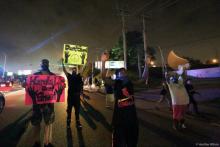implicit bias

I walked across the school yard and through the ominous painted doors of St. Athanasius Elementary School for the first time. My mother and I had walked hand in hand the long city block from home to the school, across the school yard, through the entrance, down the hallway, heels now echoing against linoleum and lockers as the smell of chalk and mimeographed copies wafted from each classroom we passed.
We entered my second-grade classroom where I was greeted by the teacher who told me to take my seat four heads from the front. That seat was my second home for half of every day for a year.
I had high hopes for second grade. At the very least, I hoped it would be safe. It wasn’t.
The girl who sat behind me demanded 25 cents per day to be my friend — or else. But worse, the white woman charged with teaching our classroom full of African-American children ruled us as if we were in her military camp … or worse… prison.
My teacher once punched me in the back because I forgot to hand in an assignment — in second grade.
Now take that single act of aggression and magnify it: a punch in the back becomes a suspension, an expulsion, or an arrest. Then systematize it. Call it a “Zero Tolerance” policy and spread it across 90 percent of schools in the United States. Then apply the policy inequitably, such that African-American children are punished at higher rates and more severely than white children. That is what happened when the culture of severe punishment promoted by the Tough on Crime movement permeated education systems throughout the 1990s.

I’ve been calling it the Summer of Helplessness.
From the conflict in Gaza that has left more than 1,000 civilians dead, to the downing of Malaysia Airlines Flight 17 over the skies of Ukraine, to the Ebola breakout getting worse by the day, to the shooting of yet another unarmed black teenager here in the U.S., the news of late is enough to make a person feel paralyzed with helplessness and despair. My prayers these days are of the tired, desperate sort: How long, O Lord? Will you hide your face from us forever?
But when it comes to violence and oppression, we are rarely as helpless as we think, and this is especially true as the events unfolding in Ferguson force Americans to take a long, hard look at the ongoing, systemic racism that inspired so many citizens to protest in cities across the country this week.
I’ve heard from many of my white friends and readers who say they aren’t sure how to respond to the anger and grief they are watching on TV or hearing from their black friends. They want to be part of the solution but don’t know where start. They may even feel a little defensive when they hear people talking about white privilege or inaction on the part of white Christian leaders. I’m in the process of learning too, but as I’ve listened to people of color whose opinions I trust, I’ve heard them issue several calls to action we can all heed.

I have so much emotions and thoughts in my mind, heart, and body – in light of the oh-so-much that is going on all around the world – including the utterly tragic, brutal, and unnecessary “death” of Michael Brown.
But I thought it would be helpful to share a few thoughts how churches, Christians, and leaders can be engaging the events of the past 11 days in their respective churches – now and in the future. I’m not suggesting that pastors have to completely alter their sermons or Bible studies, but to altogether ignore the injustice of Michael Brown’s death would be altogether foolish.
To be blunt and I say this respectfully,
The integrity of the church is at stake because when it’s all said and done, it’s not a race issue for me — it’s a Gospel issue. It’s a Kingdom issue. We shouldn’t even let isolated issues in themselves hijack the purpose of the church. The Gospel of Christ is so extraordinary that it begins to inform (and we pray, transform) all aspects of our lives. So, in other words, we talk about race and racism because we believe in the Gospel.
So, here are five suggestions for Christians, leaders, and churches.